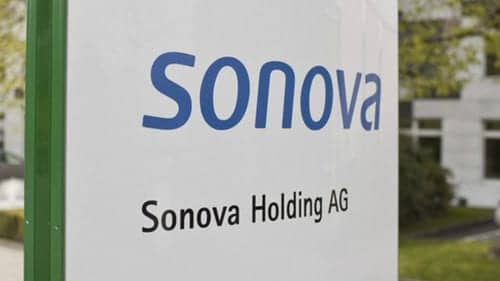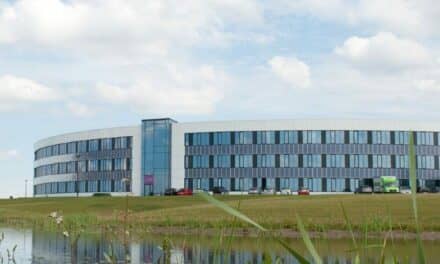Sonova Holding AG, Stäfa, Switzerland—one of the largest hearing device manufacturers in the world and the parent company of Phonak, Unitron, and Advanced Bionics—reported solid financial performance for the 2017/18 financial year, achieving sales of CHF 2.65 billion (US$2.68 billion), up 10.4% in Swiss francs, driven by organic growth in both hearing aids and cochlear implants and further supported by acquisitions.
Normalized for one-time costs, Group EBITA reached CHF 551.6 million ($558 million), an increase of 14.6% in Swiss francs and 12.3% in local currencies. According to the company, the launch of the SWORD™ Made For All wireless chip set a new industry benchmark for direct connectivity that will drive the product pipeline across all brands and enable a whole range of new features and services with significant consumer benefits.
“Today’s results demonstrate the benefits of our consistent strategy implementation and reflect the ongoing success of Sonova’s innovative product portfolio, including our complete range of rechargeable solutions and the success of our initial offering based on our unique 2.4 GHz Made For All wireless chip SWORD,” said Sonova CEO Arnd Kaldowski in a May 22 press statement. “We made good progress with integrating AudioNova and significantly expanded the profitability across the Group. Our full product pipeline and our broad global presence across all channels allow us to move even closer to the consumer and puts us on a clear path for sustained profitable growth.”
Although financial analysts noted weaker organic growth for Sonova’s hearing aid segment in the last half of the company’s fiscal year (2.9% in H2 vs 5.2% in H1 2017/18), the weaker growth was largely offset by better cost controls and a higher EBITA.
Sales driven by acquisitions and organic growth. According to the company, Sonova Group sales increased by 9.0%, representing an overall organic growth of 3.8% plus 6.0% growth from acquisitions, including those made in this reporting period and the full-year effect of prior year acquisitions. The full-year effect mainly consists of five additional months of AudioNova, the second largest dispensing chain in Europe (after Amplifon) which was acquired by Sonova in September 2016.
Decrease in own-retail sales erases other US gains; stronger growth elsewhere. Sonova’s sales in the United States declined by 1.8% in local currency from the prior year. Low single-digit growth in the hearing instruments and cochlear implants businesses was more than offset by a lower sales level in the retail network. Sonova says its streamlining and repositioning of this business is now well advanced. The US accounted for 28% of Group sales in 2017/18, down from 33% in the prior year, while the rest of the Americas (excluding the US) achieved a 9.0% sales increase in local currencies, with accelerating growth in the second half year.
Europe, Middle East, and Africa (EMEAS)—Sonova’s largest region—provided a strong increase in sales of 16.3% in local currencies. The company says it saw organic growth in most markets within the region, supplemented by the full-year effect of the AudioNova acquisition and a further expansion of our retail footprint. This was partially offset by the effects of a difficult market environment in Germany and the Netherlands. The EMEA share of Group sales increased from 48% in 2016/17 to 53%.
Sales in the Asia/Pacific (APAC) region rose by 9.4% in local currencies. Strong growth in Japan and China was partially offset by a weaker development in Australia. The cochlear implants business in China benefited from sales worth CHF 7.7 million ($7.8 million) made through a central government tender.
Hearing aid sales. Sales in the hearing instruments segment grew by 10.6% in Swiss francs and 9.0% in local currencies to reported sales of CHF 2,423.1 million. Organic growth was 3.3%, while the contribution from acquisitions in the reporting period and the full-year effect of prior year acquisitions was 6.6% or CHF 143.8 million ($145.4 million). Growth was reduced by 0.9% through disposals, mainly in the retail business. Exchange rate fluctuations, primarily a stronger Euro, contributed 1.6% to growth in Swiss francs.
As in the prior year, Sonova reports that its Premium hearing instruments achieved the strongest growth, with sales up 11.8% in local currencies, followed by the Advanced and Standard categories with an increase of 5.4% and 4.5%, respectively. The higher growth in the Premium category was driven by the continuing success of the company’s product portfolio, in particular the further expansion of rechargeable solutions and the launch of what Sonova reports is the industry’s first hearing aid with direct universal wireless connectivity functionalities, generating ongoing improvement in the product mix and average selling prices (ASPs).
Sales of wireless communication systems reportedly showed good momentum with a rise of 7.7% in local currencies, almost exclusively from organic growth. Sales in the “miscellaneous” product category, which includes accessories, batteries, and services, increased strongly by 20.4% in local currencies, both from solid organic growth and the full-year effect of the AudioNova acquisition, which has a higher revenue share in this category.
The hearing instruments business, which includes sales to independent audiologists, retail chains, multinational, and government customers, but excludes Sonova’s own retail business, grew 4.2% in local currencies to CHF 1,441.6 million ($1,457.3 million). Organic growth was 4.7%, driven by the rechargeable and wireless connectivity innovations mentioned above, along with the further deployment of the Phonak Belong™ and the Unitron Tempus™ platforms. Solid growth was achieved across all regions, with double-digit organic growth in major markets including Canada, France, UK, Italy and Japan, partially held back by a more modest development in Germany and the United States.
The retail business increased sales by 17.2% in local currencies to CHF 981.5 million; growth was driven by acquisitions and improving organic sales development in the second half. Solid organic growth in a number of key markets, including UK, Belgium, Canada, France, Poland and New Zealand, was partially offset by a weaker development in Germany and Australia. In addition, business in the US and the Netherlands continued to be affected by the streamlining and strategic repositioning of Sonova store networks, says the company. The integration of the AudioNova acquisition has further progressed and the conversion of its product portfolio to Sonova technology has been completed ahead of plan. Growth was also affected by the sale of non-strategic retail assets, including the AudioNova businesses in France and Portugal in March and April 2017 respectively.
Gross profits, operating and R&D expenses, and EBITA. The Group’s total workforce at the end of the 2017/18 financial year was 14,242 full-time equivalents—an increase of only 153 over the previous year after taking into account acquisitions and disposals, including the sale of the company’s US Hearing Service Plan business at the end of the fiscal year. In line with company strategy, Sonova continued to add staff in customer-facing functions and in R&D.
Gross profit reached CHF 1,868.2 million ($1888.6 million), an increase of 13.1% in Swiss francs and of 11.3% in local currencies. Reported operating expenses, including other operating income, were CHF 1,335.7 million ($1350.3 million). This included one-time costs of CHF 19.2 million ($19.4 million) related to the AudioNova acquisition, specifically to integration and restructuring.
Sonova reported that its research and development (R&D) expenses were CHF 142.9 million ($144.5 million), an increase of 4.3% in local currencies, underlining its continued commitment to innovation. Technology developments in the field of wireless connectivity again represented an important share of the R&D efforts. The increased relative share of the retail business means that R&D spending as a percentage of sales declined from 5.7% to 5.4%.
Reported operating profit before acquisition-related amortization (EBITA) was CHF 532.5 million ($538.3 million), an increase of 15.0% in Swiss francs or 12.7% in local currencies. Reported EBITA margin rose to 20.1% (2016/17: 19.3%), mainly reflecting solid operating leverage from organic growth supplemented by a minor benefit from the exchange rate developments. Normalized for one-time costs, EBITA increased by 14.6% in Swiss francs or 12.3% in local currencies to CHF 551.6 million ($557.6 million), corresponding to a margin of 20.8%. Including the expected increase in acquisition-related amortization from the AudioNova acquisition, reported operating profit (EBIT) reached CHF 483.0 million ($430.6 million), up by 14.0%.
Reflecting the strong growth in EBIT, basic earnings per share (EPS) reached CHF 6.13 ($6.20), a significant increase of 14.6% from the prior year. Normalized for one-time costs, EPS increased 14.0% to CHF 6.36 ($6.46).
Outlook for 2018/19. Sonova expects continued solid growth in sales and profitability across the hearing instruments and cochlear implants segments during 2018/19, supported by an attractive product and solutions portfolio and its continued commitment to innovation. Organic growth is expected to reach 3-5%. The net impact of acquisitions and of the disposal of non-core retail assets, as well as the US Hearing Service Plan business, is expected to reduce growth by around 1%, with a small impact on profitability. Therefore, Sonova says it expects overall sales to grow in the range of 2-4% and EBITA to increase by 6-9% (compared to normalized FY 2017/18 EBITA), both measured in local currencies. At May 2018 exchange rates, the guidance implies a mid-teens growth in reported EPS in Swiss francs for 2018/19.
Analysts noted this guidance was essentially in line with consensus.






